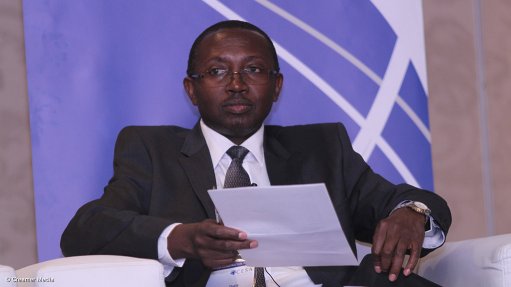
Cesa president Abe Thela
Photo by: Duane Daws
South Africa’s education sector was in crisis, with the World Economic Forum ranking the country as the worst faring in maths and science out of 143 countries, Consulting Engineers South Africa (Cesa) president Abe Thela said on Monday.
The state of human capital development in the country was hampering economic growth, he told delegates at this year’s Cesa Infrastructure Indaba, in Johannesburg.
“It is common knowledge that our education system is failing to produce adequate marks in maths in science. This is a crisis of unparallelled magnitude and it is vital that we address it,” he noted.
While permanent solutions were being sought, Thela encouraged the private sector to play its part.
“Many institutions run extra classes for grade 10 to 12 pupils on Saturdays and during school holidays. We call on Cesa members to do the same,” he said, adding that the organisation was in the process of collating all the initiatives being carried out by its members to run one programme that would run from Cesa’s head office.
Also speaking at the conference, Department of Transport director-general Pule Selepe stated that, while government’s build programme was laying a strong foundation for social and economic growth, skills enhancement and development were critical.
“We are facing an unprecedented skills challenge, particularly in transport. When the apartheid government stopped investing in transport, it also ceased investing in skills and now we are living with that legacy,” he said.
Selepe emphasised that more young people needed to be involved in maths, science, technology and engineering.
“As government, we believe it is better to invest in homegrown talent, which will drive the skills revolution,” he noted, adding that skills and education training authorities were contributing towards its goals, generating 150 rail artisans, 200 rail apprentices and 1 300 learners that were trained last year.
“Together, we need to find ways to bring more engineers into the infrastructure sector to transform the national landscape and contribute to the country’s prosperity,” he added.
Selepe further advanced that the country currently had a road infrastructure backlog of R197-billion, with the country requiring funding and skills to ensure it had dependable, trustworthy infrastructure.
“Together [with the private sector] we can achieve more, but it will not happen overnight. We have never had such a great opportunity than we have today,”
Meanwhile, Thela noted that while government initiatives aimed at beefing up the roll-out of the country’s infrastructure provided interim solutions to some of South Africa’s significant socioeconomic challenges, there was a dire need for long-term solutions.
He highlighted that tangible progress had been made in addressing these challenges, including the creation of a centralised supplier database, which he encouraged delegates to join.
However, Thela pointed out that the infrastructure sector was still lagging and that government, together with increased spending from the private sector, could do more to advance it.
“We need to address inefficiencies in the supply chain, which includes inappropriate approaches to procuring consulting engineering services and a lack of technical project management capacity, which results in poor planning, management and implementation of infrastructure,” he asserted.